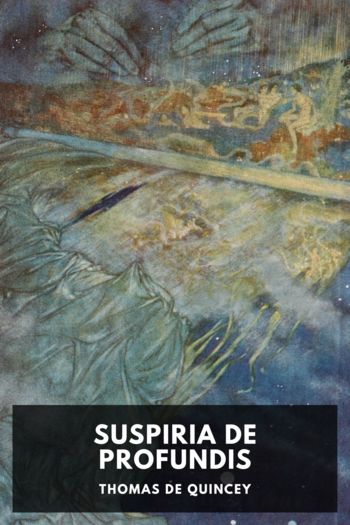Confessions of an English Opium-Eater, Thomas De Quincey [best books for students to read TXT] 📗

- Author: Thomas De Quincey
Book online «Confessions of an English Opium-Eater, Thomas De Quincey [best books for students to read TXT] 📗». Author Thomas De Quincey
This is the doctrine of the true church on the subject of opium: of which church I acknowledge myself to be the only member—the alpha and the omega: but then it is to be recollected that I speak from the ground of a large and profound personal experience: whereas most of the unscientific13 authors who have at all treated of opium, and even of those who have written expressly on the materia medica, make it evident, from the horror they express of it, that their experimental knowledge of its action is none at all. I will, however, candidly acknowledge that I have met with one person who bore evidence to its intoxicating power, such as staggered my own incredulity; for he was a surgeon, and had himself taken opium largely. I happened to say to him that his enemies (as I had heard) charged him with talking nonsense on politics, and that his friends apologized for him by suggesting that he was constantly in a state of intoxication from opium. Now the accusation, said I, is not primâ facie and of necessity an absurd one; but the defence is. To my surprise, however, he insisted that both his enemies and his friends were in the right. “I will maintain,” said he, “that I do talk nonsense; and secondly, I will maintain that I do not talk nonsense upon principle, or with any view to profit, but solely and simply, said he, solely and simply—solely and simply (repeating it three times over), because I am drunk with opium, and that daily.” I replied that, as to the allegation of his enemies, as it seemed to be established upon such respectable testimony, seeing that the three parties concerned all agree in it, it did not become me to question it; but the defence set up I must demur to. He proceeded to discuss the matter, and to lay down his reasons; but it seemed to me so impolite to pursue an argument which must have presumed a man mistaken in a point belonging to his own profession, that I did not press him even when his course of argument seemed open to objection; not to mention that a man who talks nonsense, even though “with no view to profit,” is not altogether the most agreeable partner in a dispute, whether as opponent or respondent. I confess, however, that the authority of a surgeon, and one who was reputed a good one, may seem a weighty one to my prejudice; but still I must plead my experience, which was greater than his greatest by 7,000 drops a day; and though it was not possible to suppose a medical man unacquainted with the characteristic symptoms of vinous intoxication, it yet struck me that he might proceed on a logical error of using the word intoxication with too great latitude, and extending it generically to all modes of nervous excitement, instead of restricting it as the expression for a specific sort of excitement connected with certain diagnostics. Some people have maintained in my hearing that they had been drunk upon green tea; and a medical student in London, for whose knowledge in his profession I have reason to feel great respect, assured me the other day that a patient in recovering from an illness had got drunk on a beefsteak.
Having dwelt so much on this first and leading error in respect to opium, I shall notice very briefly a second and a third, which are, that the elevation of spirits produced by





Comments (0)